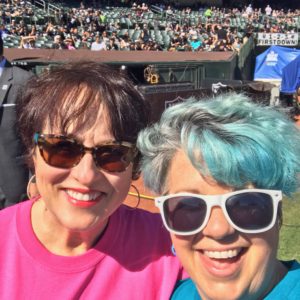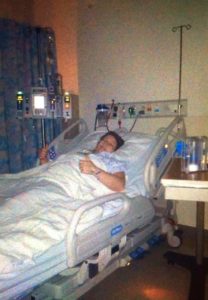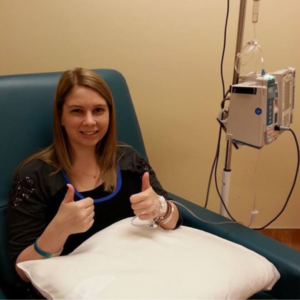As cervical cancer survivors, we advocate to bring more awareness to cervical cancer and all gynecologic cancers. Our cancers do not have the same visibility as breast cancer but there was a time when breast cancer was not even talked about, let alone celebrated.

Today, breast cancer awareness is everywhere and some people don’t remember a time before all the pink. But I am over 50 and I do remember when the women in my family talked in hushed voices about a friend who had just been diagnosed with breast cancer. Those hushed voices are what I still hear today when others talk about cervical, or dare we say vaginal cancer.
But what is most important to remember is that all of these cancers are women’s cancers. They all can take away body parts we feel make us women – breasts, reproductive organs, cervixes, vaginas. Then we are left with redefining what it means to be a woman, what makes us whole again. And this is not easy. Our cancers are devastating. They leave lifelong scars and pain physically and emotionally that sometime never heals. As women, we fight hard every day for equality; to have a seat at the table, to be heard and we should be able to look to each other for support, especially when it comes to our bodies. Today, more than ever, is the time to come together and advocate for women’s health. Every month. Every day.
October is Breast Cancer Awareness Month (BCAM) and I will do my part to support my friends and loved ones who lives have been forever changed by this disease. These same friends support me now and come January when my social media feeds becomes Cervivor teal & white, they will be there sharing my story and the stories of my Cervivor tribe.
Note: The American Congress of Obstetricians and Gynecologists recommends starting yearly mammograms at age 40 for those at average risk of developing breast cancer. If you are at higher risk, ask your healthcare provider what tests are right for you.
Carol Lacey is a 7-year cervical cancer thriver and Cervivor Ambassador. She lives in Northern California where she raised two amazing humans, shares a home with her CervivorMan and their two fur babies. Read her Cervivor story here.
 That was an amazing feeling, but at the same time, I didn’t realize that the most difficult part of my cancer diagnosis still lay ahead.
That was an amazing feeling, but at the same time, I didn’t realize that the most difficult part of my cancer diagnosis still lay ahead. Being different is difficult. By looking at me, you’d probably never be able to guess that I was as sick as I actually was. You’d never know that I had an ugly surgery scar on my abdomen. You’d never know that I have 3 little green radiation tattoos that bring back painful memories when I look at them. You’d never know that the treatments affected my body so much that I still struggle with the side effects that will never go away. And, you’d never know that cancer took away my chance to ever have biological children. I am now at an age where a question that I tend to get from people is whether or not I have any children. When I tell them that I don’t, they usually follow up with the question “Well, why not?” It’s in that moment I always have to decide just how in depth I want to go about my situation, and it can be an awkward experience for both of us.
Being different is difficult. By looking at me, you’d probably never be able to guess that I was as sick as I actually was. You’d never know that I had an ugly surgery scar on my abdomen. You’d never know that I have 3 little green radiation tattoos that bring back painful memories when I look at them. You’d never know that the treatments affected my body so much that I still struggle with the side effects that will never go away. And, you’d never know that cancer took away my chance to ever have biological children. I am now at an age where a question that I tend to get from people is whether or not I have any children. When I tell them that I don’t, they usually follow up with the question “Well, why not?” It’s in that moment I always have to decide just how in depth I want to go about my situation, and it can be an awkward experience for both of us.